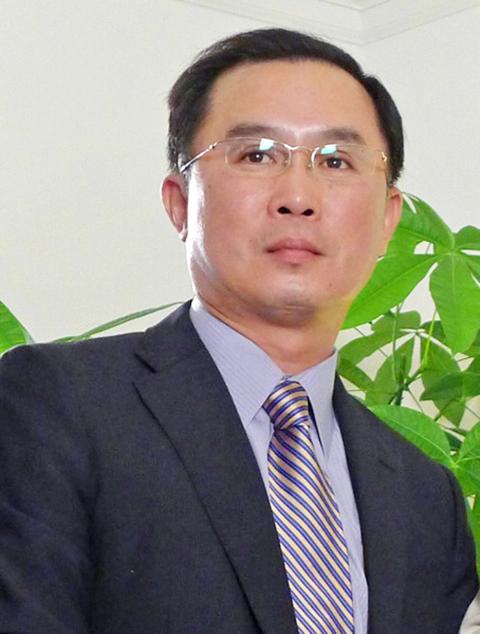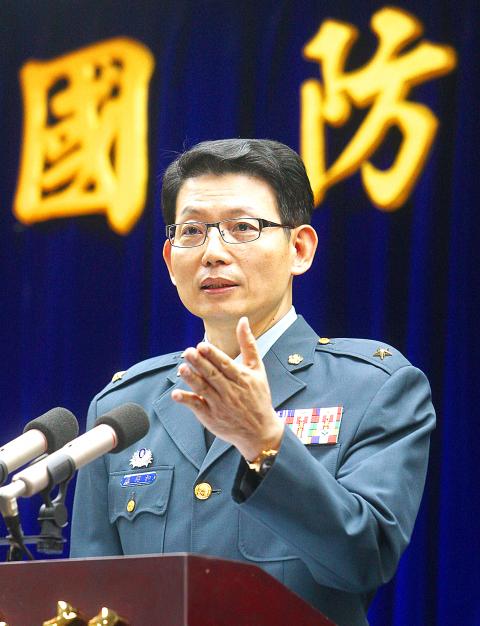The Ministry of National Defense confirmed yesterday that Army Major General Li Hsien-sheng (黎賢聖), who was the director in charge of Taiwan’s defense mission in the US, has been removed from his post after he failed lie-detector tests in May.
It has been reported that Li made “unauthorized contacts” in the US.
The removal of Li from his post has raised alarm bells because the defense mission, which has an office in Washington, is responsible for the air force’s purchase of upgrades to its F-16A/B jets, procurement and upgrading of the US long-range early-warning radar system and other arms deals, as well as conducting dialogue on Taiwan-US strategic military planning.

Photo: CNA
As such, experts said the mission has access to highly classified information and military intelligence, and has high-level contact with the US Department of Defense. Therefore, the removal of Li from his post after failing a lie-detector test is of great concern in military and national security circles.
Li’s situation has also raised eyebrows because he was a trusted aide of former minister of national defense Kao Hua-chu (高華柱), and had access to sensitive information on Taiwan-US military exchanges and arms programs.
Ministry spokesman Major General David Lo (羅紹和) said yesterday Li was replaced as head of the mission by navy Rear Admiral Yang Ta-wei (楊大偉) and that Li is now back in Taiwan serving at the Army Command Headquarters.

Photo: CNA
These are troubled times for the defense mission, as it has had four directors within the past five years, with Li being the latest casualty.
Former director Chen Ching-chung (陳敬忠) was investigated for unauthorized use of funds for intelligence operations and charged with corruption in 2010.
Other Taiwanese military officials at the mission have been dismissed for being involved in bribery scandals and having “suspicious contacts” with arms dealers.
The lie-detector tests are administered to staff stationed overseas to check if a subject has had contact with “inappropriate people,” such as Chinese nationals and foreign spies.
Lo said the questions administered during the polygraphs were classified and no details can be divulged.
“The ministry is conducting a further investigation into this matter. Li is facing up to the situation in a calm, straightforward manner. He wants to prove that he has not done anything to let down his country,” Lo said.
He said that failing the test does not mean Li lied, because the results could be affected by other factors, such as physical or mental condition, medication and fatigue after flying back to Taiwan.

MORE VISITORS: The Tourism Administration said that it is seeing positive prospects in its efforts to expand the tourism market in North America and Europe Taiwan has been ranked as the cheapest place in the world to travel to this year, based on a list recommended by NerdWallet. The San Francisco-based personal finance company said that Taiwan topped the list of 16 nations it chose for budget travelers because US tourists do not need visas and travelers can easily have a good meal for less than US$10. A bus ride in Taipei costs just under US$0.50, while subway rides start at US$0.60, the firm said, adding that public transportation in Taiwan is easy to navigate. The firm also called Taiwan a “food lover’s paradise,” citing inexpensive breakfast stalls

TRADE: A mandatory declaration of origin for manufactured goods bound for the US is to take effect on May 7 to block China from exploiting Taiwan’s trade channels All products manufactured in Taiwan and exported to the US must include a signed declaration of origin starting on May 7, the Bureau of Foreign Trade announced yesterday. US President Donald Trump on April 2 imposed a 32 percent tariff on imports from Taiwan, but one week later announced a 90-day pause on its implementation. However, a universal 10 percent tariff was immediately applied to most imports from around the world. On April 12, the Trump administration further exempted computers, smartphones and semiconductors from the new tariffs. In response, President William Lai’s (賴清德) administration has introduced a series of countermeasures to support affected

CROSS-STRAIT: The vast majority of Taiwanese support maintaining the ‘status quo,’ while concern is rising about Beijing’s influence operations More than eight out of 10 Taiwanese reject Beijing’s “one country, two systems” framework for cross-strait relations, according to a survey released by the Mainland Affairs Council (MAC) on Thursday. The MAC’s latest quarterly survey found that 84.4 percent of respondents opposed Beijing’s “one country, two systems” formula for handling cross-strait relations — a figure consistent with past polling. Over the past three years, opposition to the framework has remained high, ranging from a low of 83.6 percent in April 2023 to a peak of 89.6 percent in April last year. In the most recent poll, 82.5 percent also rejected China’s

PLUGGING HOLES: The amendments would bring the legislation in line with systems found in other countries such as Japan and the US, Legislator Chen Kuan-ting said Democratic Progressive Party (DPP) Legislator Chen Kuan-ting (陳冠廷) has proposed amending national security legislation amid a spate of espionage cases. Potential gaps in security vetting procedures for personnel with access to sensitive information prompted him to propose the amendments, which would introduce changes to Article 14 of the Classified National Security Information Protection Act (國家機密保護法), Chen said yesterday. The proposal, which aims to enhance interagency vetting procedures and reduce the risk of classified information leaks, would establish a comprehensive security clearance system in Taiwan, he said. The amendment would require character and loyalty checks for civil servants and intelligence personnel prior to